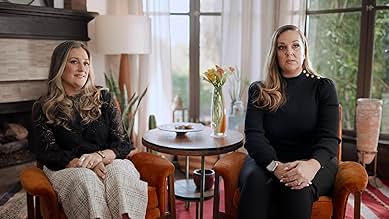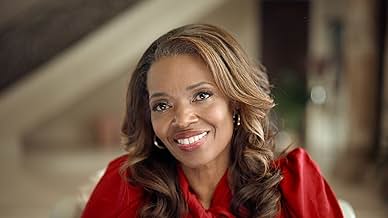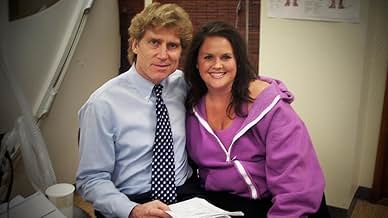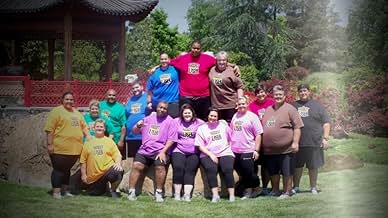Fit for TV: il lato oscuro di un reality
Titolo originale: Fit for TV: The Reality of the Biggest Loser
Dà uno sguardo approfondito alla realizzazione del famoso concorso di reality TV, esplorando il bene, il male e il complicato.Dà uno sguardo approfondito alla realizzazione del famoso concorso di reality TV, esplorando il bene, il male e il complicato.Dà uno sguardo approfondito alla realizzazione del famoso concorso di reality TV, esplorando il bene, il male e il complicato.
Sfoglia gli episodi
Recensioni in evidenza
I watched The Biggest Loser with my wife at the time. Good grief, anyone who had watched the first season knew EXACTLY what they were getting themselves into. They'd seen Bob and Jillian get up in the faces of the contestants, and raise their voices as part of the motivation. ANYONE who was involved in team sports in high school has endured far worse than that. Joelle seemed to lock herself into a power struggle with her coach. She deliberately held back during training sessions as a way of holding onto that little bit of control. Her negative experiences on TBL seem to be rooted in the fact that her personality was completely unsuited for the show. Crying that there isn't "aftercare" for contestants after the show is the most entitled nonsense. Grow up. The program helped you lose a large amount of weight, it's on you to change your life if you want to keep it off. Caffeine as a scandal? C'mon.
It was a fascinating watch, but I'm not sure it really went anywhere. There was no solid finding or conclusion-just a range of opinions. So, not a great ending.
For me, however, there were some takeaways:
1. The treatment of the woman with rhabdomyolysis was appalling. If her allegations are true, she is owed at least an apology from the trainers and producers-possibly more. It's a reminder that very few people truly understand rhabdo.
2. The Biggest Loser was always about entertainment and money. It was a mistake to think otherwise.
3. The doctor seemed like a good guy. I only wish he had been more outspoken.
4. Weight loss isn't achieved by exercise-it's about calorie deficit. As Bob acknowledged, the exercise was largely for show. At the same time, too steep a calorie deficit is dangerous and unhealthy in the long term. The trainers should have known better.
5. There was definitely some fat-shaming. And some of what the trainers did crossed the line.
For me, however, there were some takeaways:
1. The treatment of the woman with rhabdomyolysis was appalling. If her allegations are true, she is owed at least an apology from the trainers and producers-possibly more. It's a reminder that very few people truly understand rhabdo.
2. The Biggest Loser was always about entertainment and money. It was a mistake to think otherwise.
3. The doctor seemed like a good guy. I only wish he had been more outspoken.
4. Weight loss isn't achieved by exercise-it's about calorie deficit. As Bob acknowledged, the exercise was largely for show. At the same time, too steep a calorie deficit is dangerous and unhealthy in the long term. The trainers should have known better.
5. There was definitely some fat-shaming. And some of what the trainers did crossed the line.
This show which could or should have been interesting was just a bunch of click bait. It was a reality show about a reality show. People being mad tv did tv things is comical. I remember plenty of these people having a much different story after the show for years but now they have clearly lost their shine so they are coming back for more.
The documentary itself is not bad. It's entertaining and has some not bad stories.
However, what bothers me is the narrative: A bunch of whining Americans, who knew exactly what they were signing up to and got that exact thing. You couldn't say you didn't know! Ok for season 1 or 2, but all following seasons? You didn't watch it? What are you whining about? You wanted this! This is a TV show meant to create ratings and interest. You want to lose weight by yourself, go hire a trainer and a nutritionist and don't sign up to a TV show and then whine endlessly.
However, what bothers me is the narrative: A bunch of whining Americans, who knew exactly what they were signing up to and got that exact thing. You couldn't say you didn't know! Ok for season 1 or 2, but all following seasons? You didn't watch it? What are you whining about? You wanted this! This is a TV show meant to create ratings and interest. You want to lose weight by yourself, go hire a trainer and a nutritionist and don't sign up to a TV show and then whine endlessly.
7j_l_
Almost all of these *adult* contestants had watched the show and knew what to expect as far as how intense the trainers were, challenges/temptations, etc... and they still signed up because they "wanted to be on the show so badly." And they also could have left willingly at any time, and they stayed. But still somehow found a way to paint themselves as victims. Joelle is *still* absolutely insufferable. Zero self awareness or accountability. Every contestant was handed a life-changing opportunity to do and accomplish hard things - and knew it would be grueling and sometimes embarrassing. But somehow instead of gratitude, so many of them can only focus on the negative. Like they were owed something. Reality TV - in general - is embarrassing. And that's sort of the point. Whether is housewives or dating shows, you're giving up something (often their dignity) to get something. Stop complaining about it. You knew. Even Tracey, when asked at the end if she'd go back on the show, she couldn't definitively answer - insinuating that possibly yes she would - even after all her complaining.
I più visti
Accedi per valutare e creare un elenco di titoli salvati per ottenere consigli personalizzati
Dettagli
- Data di uscita
- Paese di origine
- Lingua
- Celebre anche come
- Fit for TV: The Reality of the Biggest Loser
- Azienda produttrice
- Vedi altri crediti dell’azienda su IMDbPro
- Tempo di esecuzione
- 2h 4min(124 min)
- Colore
Contribuisci a questa pagina
Suggerisci una modifica o aggiungi i contenuti mancanti

































